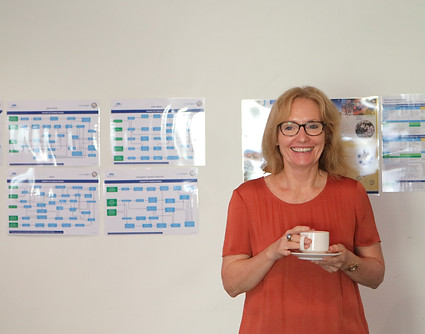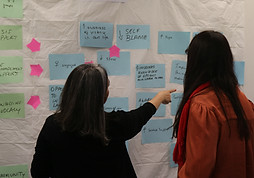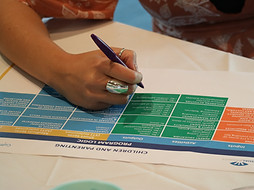

Evaluation Made Easy
Intermediate Modelling
Strengthening your models and design for communication


Theory of change and program logic models are powerful communication tools both for your team and organisation and for your external stakeholders. Take your models to a new level with our intermediate level package
Intermediate Evaluation Modelling is a four session (4-6 week) flexible course designed to support facilitators in building the strength and evidence-base of their evaluation models with their team. The practical package is designed to engage your team in advancing their draft models by incorporating the research literature, systems thinking and principles.
Using the toolkit from Evaluation Modelling (EME-2) we will guide you in building rigorous models ready to share with your stakeholders. Come away with engaging laminated A3 graphic designed posters of your theory of change and program logic.
TEAM RESOURCES
What you get




FACILITATOR RESOURCES
REGULAR, EXPERT TRAINING SUPPORT
GRAPHIC-DESIGNED EVALUATION MODELS
How it Works




INTRODUCTION TO COURSE FACILITATION
Receive the Facilitator materials.
Participate in a live online session where you will meet the evaluation coach (Dr. Samantha Abbato) and the other facilitators (Maximum of 8). This includes an overview of how the course and coaching will work for the 4 weeks of sessions.
Approximately weekly commitment is:
-
90-120 minutes preparation, coaching, and debriefing
-
90-120 minutes team facilitation.
*Additional toolkits are available if you need more for your team.
SUPPORT FOR EACH SESSION AND TOPIC
Participate in group coaching for each of the 4 sessions and topics. Be guided through the materials for each session using a Facilitator's Guide - including a 20-minute video presentation, a PowerPoint Slide Pack and instructions for team activities. All activities are designed so you can support your team to work on building theories of change and program logic.
Designed Activity Sheets and Activity Templates will provide direction for applying the topic to your situation. These will be provided in the course toolkit as well as online formats to give you and your team flexibility.
FACILITATE YOUR TEAM AND BUILD CAPACITY
Each week, you will be supported to provide a presentation on the topic to your team. You can choose from a 20-minute video or use an annotated PowerPoint slide pack to present.
Follow the instructions provided in the facilitators guide, on the Toolkit components and the online activity platform to support your team in participating in an activity.
Team reward is to build evaluation capacity whilst working on their own projects.
Additional facilitator reward is roughly 90% retained learning by teaching (compared to 5% from attending a presentation on the topic.
PARTICIPATE IN LIVE VIDEO CONFERENCES
Two scheduled video conference sessions for facilitators are provided.
The video sessions offer:
-
A Q&A session on the topics covered
-
The opportunity to present your team's work,
-
Networking opportunities with other facilitators participating.
In addition, you will be able to access coaching twice weekly via coaching "office hours" on Zoom with any questions along the way. You can opt for working with your team on an online platform where the evaluation coach can provide feedback on the activities you complete with your team.
Coaches monitor facilitators' discussion boards daily, to ensure you get all the support you need.
Training outcomes

TEAM/ORGANISATION OUTCOMES
-
Increased capability building rigour into theories of change / program logics
-
Graphic designed theory of change and program logic
-
Increased capacity to communicate to stakeholders using models
PARTICIPANTS' OUTCOMES
-
Ability to build and strengthen evaluation models using research literature, systems thinking and principles
-
Knowledge of and practical skills in building evaluation models
-
Ability to use evaluation models to communicate to stakeholders
TEAM FACILITATORS' OUTCOMES
-
Participant objectives (above) at a deeper level
-
Ability to guide a team in step-by-step strengthening of models
-
Increased practical evaluation facilitation skills
The Sessions and Topics
What others are saying...
01

building model strength using research literature
After reviewing the application of results chains archetypes to your theory of change model, we introduce practical ways of incorporating the research literature. Be guided in a step-by-step approaches to using research to continue to build your model and to provide it a strong evidence-base.
02

applying principles to future-proof your models
Identifying values, articulating guiding principles and checking for changes in context and needs, and assumptions will enable you to review and reframe your models for times of rapid change. In the activity you will interrogate and revise your models to strengthen them.
03

introduction to systems thinking for complexity
Systems thinking is a problem-solving approach and a sense-making process that incorporates an understanding of context. We introduce three major tools that incorporate real-world complexity and context into evaluation models - interactions, boundaries and perspectives.
04

review, refine and design for communication
Reflecting on evaluation model purpose, users and use, we guide you in refining and designing your theory of change and program logic. Come away from this course with visually attractive A3 evaluation posters for your team and stakeholders.
Are you ready for it?
The Evaluation Modelling (EME-3) training package is ideal for your team if you:
-
Have completed VIP Introduction to Evaluation Modelling (EME-2)
-
Want to improve the service you provide to participants by strengthening program reflection, learning and planning
-
Want to encourage and motivate evaluative thinking in your team and organisation
-
Want to effectively communicate what you do, how you do it and the difference you make, to stakeholders using evaluation models.
Contact us or register your team to take steps to build evaluation capability and organisational strength.
